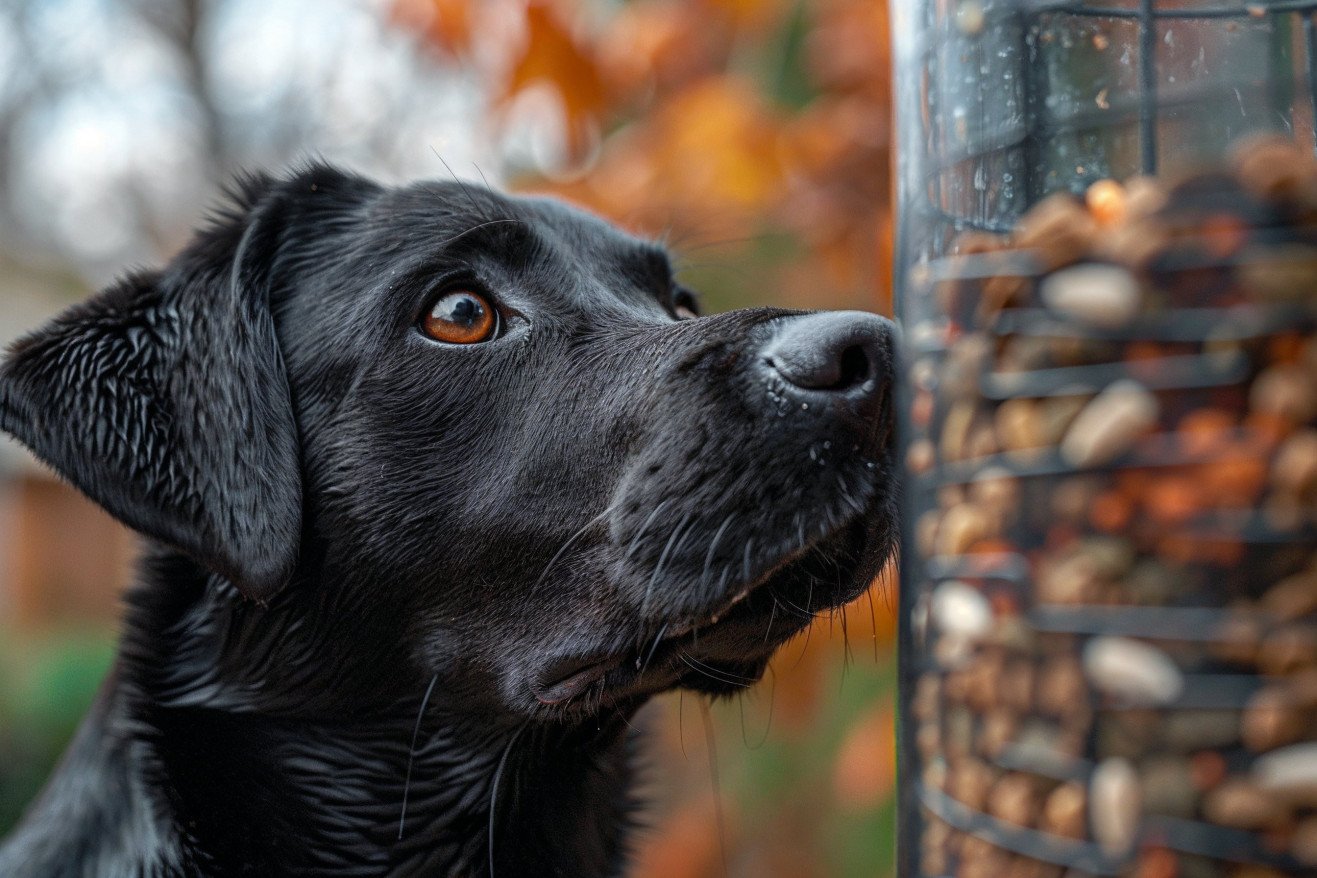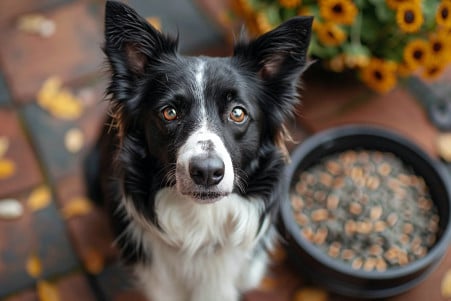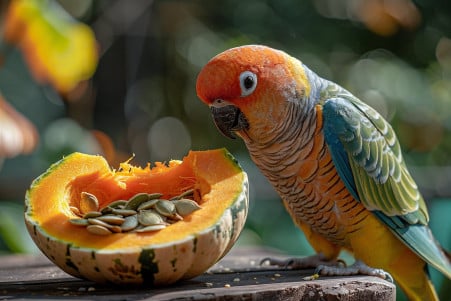Can Dogs Eat Bird Seed? Risks and Benefits Explored
18 May 2024 • Updated 18 May 2024

Whether you're a bird owner who's worried about your dog getting into your pet's seed mix or you've caught your dog eating the bird seed you put out for the wild birds in your backyard, you may be wondering if bird seed is safe for dogs. While small amounts of bird seed are unlikely to cause any harm, larger amounts can lead to digestive upset, including vomiting and diarrhea, because bird seed is high in fat and fiber. If your dog eats bird seed, make sure to keep an eye on them and call your vet if they start to exhibit any symptoms of distress.
By reviewing the available scientific and veterinary literature, we'll take a closer look at the nutritional content of some of the most popular types of bird seed and the potential impact of these ingredients on a dog's well-being. This investigation will cover everything from how much bird seed dogs can eat without any negative effects to the potential problems associated with certain ingredients, including allergens and other ingredients that can cause negative reactions in dogs.
Can dogs eat bird seed?
Potential Risks: Gastrointestinal Issues and Toxicity
Consuming large quantities of bird seed can lead to gastrointestinal distress in dogs, including vomiting, diarrhea, bloating, and even intestinal blockages or obstructions. Bird seed that has gone bad or become moldy may contain toxic aflatoxins, which can cause liver damage and other health problems.
Raisins and sultanas, which are often included in bird seed mixes, are extremely toxic to dogs and can cause kidney failure even in small doses. In addition, bird droppings on or near bird seed can expose dogs to harmful bacteria like salmonella and parasites.
If a dog has ingested bird seed, signs of distress like lethargy, loss of appetite, and jaundice should be evaluated by a vet right away. Although small amounts may not be harmful, it's better to keep dogs away from bird seed to avoid these risks. Storing bird seed properly and cleaning up any spills can help minimize the risks.
Sunflower Seeds: OK in Moderation
Sunflower seeds are a common ingredient in bird seed mixes and are safe for dogs to eat in moderation. Per the Sidekick by Finn blog, unsalted, shelled sunflower seeds can be used as an occasional treat, but the shells should be removed to avoid the risk of choking or blockages.
That said, sunflower seeds from bird feeders may be seasoned or contain other impurities that make them less than ideal for dogs. Per the blog, sunflower seeds are high in fat and can cause sodium toxicity and pancreatitis if consumed in large amounts.
When given as part of a well-rounded diet, dogs can eat sunflower seeds, but it’s important to remember that like any treat, they should be given in moderation. As the Sidekick by Finn blog points out, sunflower seeds are high in sodium, so they should be given in limited quantities.
First Aid and Emergency Measures
If a dog eats a large amount of bird seed, it's important to watch for symptoms such as vomiting, diarrhea, abdominal pain, and difficulty breathing. Per the Quora response, the first step is to not feed or water the dog. If symptoms are severe or don't go away, make sure to take the dog to the vet immediately.
If you suspect aflatoxin poisoning from moldy seed, make sure to take your dog to the vet right away. The vet will likely provide supportive care, including fluids and anti-nausea medication, as noted in the Dogster article.
Of course, the best way to avoid these situations is to avoid the dog's access to bird seed and keep the area clean. This can be done by storing bird seed properly, placing bird feeders in the right location, and training dogs to stay away from the area.
Preventing Access and Deterring Consumption
To keep dogs from getting into bird seed, it's important to be proactive. Per the Quora response, this can mean storing bird seed in airtight containers and cleaning up any spills as soon as possible to remove access for dogs.
The Rover Q&A Community suggests using bird feeders that are inaccessible to dogs or placing them in locations that dogs can't get to. Meanwhile, training dogs to stay away from the area around bird feeders using positive reinforcement and close monitoring can work as a good deterrent.
For a less desirable option, the Talk Cockatiels Forum post suggests looking into smaller, less aromatic bird seed options that may be less appealing to dogs. In the worst-case scenario, you may need to remove bird feeders altogether to prevent your dog from continuing to eat bird seed.
By taking these steps, dog owners can make sure their dogs stay safe and healthy while still enjoying the birds in their yard.
Potential Benefits and Safer Alternatives
While bird seed is not a good food for dogs, some of the ingredients, such as millet and flaxseed, can offer some nutritional value in moderation. Millet, as mentioned in the Dogster article, is a gluten-free grain that can provide dogs with protein, fiber, and antioxidants when it's cooked and served in the right amounts.
Flaxseed and chia seeds, which are sometimes included in bird seed mixes, can also provide omega-3 fatty acids and fiber, but it's important to make sure the dog isn't getting too much of them. The Nextrition Pet blog explains that while these ingredients can be good for dogs, they should be given in moderation and not in place of a dog's complete and balanced diet.
If you want to give your dog these ingredients, you may want to look for commercial dog foods or treats that contain them. However, as the Nextrition Pet blog points out, it's important to talk to a vet before adding new ingredients or supplements to your dog's diet.
Conclusion: Making Sure Your Pet Is Safe
While eating bird seed in small amounts may not be harmful to dogs, in large quantities, it can lead to gastrointestinal issues, toxicity, and even life-threatening emergencies. Keeping dogs away from bird seed and ensuring that the area around bird feeders is clean is the best way to ensure that dogs stay safe and healthy.
If a dog does eat bird seed, it's important to watch for signs of distress and get help from a vet if needed. As with any new food or supplement, it's important to talk to a vet about the potential risks and benefits and to make sure that you're following the appropriate portion control guidelines.
By being aware of the risks and taking the necessary steps to minimize them, dog owners can enjoy the presence of bird feeders while keeping their dogs out of harm's way.


